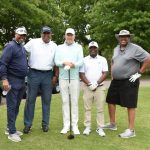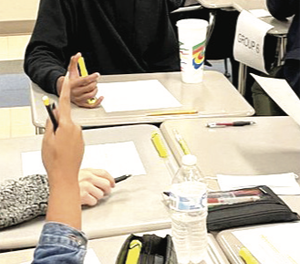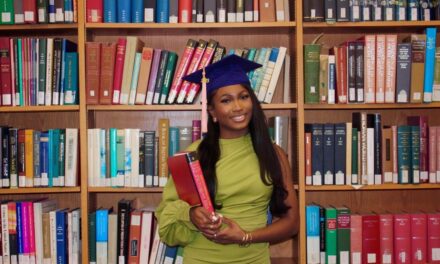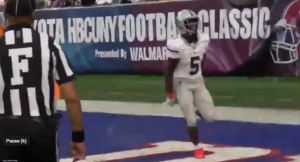Alabama News Center
It’s rare that golf comes up in connection with Historically Black Colleges and Universities (HBCUs), but four longtime friends and golf buddies say maybe it should.
Anthony Overton, a graduate of South Carolina State University, is professor and chair of the Department of Biological and Environmental Sciences at Alabama’s Samford University.
Jay Roberson, a graduate of Alabama A&M University, is the assistant vice president of Business Development at Volkert and a former Birmingham City Council member.
Kerry Stevenson, a graduate of Alabama A&M, is the vice president for Development of Athletics and Scholarships at Alabama’s Miles College.
Ralph Williams, a graduate of Miles College who also studied at Alabama A&M, is director of Community Engagement for Alabama Power.
They recently played in the sponsors invitational at the PGA WORKS Collegiate Championship, a national tournament for college golfers from HBCUs, Hispanic-serving institutions and other minority-serving institutions from across the country. The tournament took place this year at two Birmingham-area golf courses.
The four men say that golf and their HBCU experience are at the heart of their decades-long friendship and have been instrumental in much of their personal success. They want to spread the word about the value of attending an HBCU and how those college years can be enriched by spending time with friends on the golf course.
According to Black Golf Directory, golf programs exist at 35 HBCUs, including Alabama A&M, Miles and Alabama State University.
Alabama News Center recently caught up with the foursome during the PGA WORKS tournament.
What is it about the connection between golf and HBCUs?
Williams: What’s interesting about golf and HBCUs — and actually other sports like tennis and track and field — for many years … they were the only places that African Americans could play on the collegiate level. There’s always been a rich history of competition within HBCUs, but golf in particular. HBCU golfers, they move out into the world and they become professionals and they take that love for the game of golf into the communities where they work and where they raise their families and so you’ll see that, in places like Birmingham, where we have a rich tradition of Black golf culture here, Dr. Jesse Lewis is one of the persons that is known for his love for the game of golf, the Vulcan Golf Club here in Birmingham — there’s so many other Black golfers that taught me more about the etiquette of the game, being a person of integrity and playing the game with integrity, character. All those things go hand-in-hand with HBCUs and with the game of golf.
How did the game of golf enhance your HBCU experience?
Overton: So, I played for South Carolina State back in the early ’90s, and I didn’t realize the kind of impact it would have until really after I graduated. I wasn’t really aware of the impact it would have while I was in school, but after I graduated, I was able to see those connections that I had, those lessons that I was taught by my golf coach, those peer interactions that I had with my teammates – absolutely it prepared me beyond belief. I’m forever indebted to that opportunity that I had.
Roberson: I started playing it at Alabama A&M University with my roommates. It’s tremendous. They got me playing up at Huntsville in the Airport Municipal Course and, ever since then, it’s been a great opportunity for me in the corporate community, working now and even working in sports throughout my career. I’ve been able to utilize golf as a tool to network, to build business, to build relationships for life. I’ve actually extended that to my own children who are now — some in college and one in middle school — starting to play golf, to get out there. It’s a great opportunity to get that experience and Alabama A&M University is actually where I started playing golf.
Stevenson: Golf has enhanced me, period. It teaches a whole lot about life. You have some ups and downs, some highs and lows, you have to adjust and move on — try to make some tweaks here and there — and my HBCU experience was the same. I had a whole bunch of adversity that I had to face while I was there, and I had enough peers around me — lifelong friends — so we had those experiences all the way through college, all the way through now.
How the HBCU experience, and golf, shaped four men from Alabama News Center on Vimeo.
Williams: What’s interesting about the game of golf for me is one of my classmates — who was a childhood friend — was a graduate student when I got to Alabama A&M University, and he actually came back for a summer and bought me a set of clubs, a bag from Play It Again Sports, and it was the first time I ever played golf and I’ve been playing ever since. And that was well over 25 years ago. But not for me being an alum of an HBCU, I probably wouldn’t have been introduced to the game until a later time, but one of my good friends introduced me to the game of golf.
How do you know the guys on this team?
Roberson: Oh, man, we go way back. Before golf there was spades — it was a card game that we played in our apartment or our dorm room and was very competitive or we went out to the park and the basketball court, but this team here is a team of brotherhood. Guys I’ve known all my life. I’m the youngest one in the group, so I feel like they’re big brothers to me. If I die tomorrow, I know these men here will actually look out for my family. One was my roommate and one has been a dear friend for many, many years and, again, golf brings family together, golf brings friends together and golf brings brothers like us today together.
Williams: The first person I ever played golf with is Kerry Stevenson. He’s a part of this foursome. He’s an amazing person, first off. He’s very accomplished. Anthony Overton and I, and Kerry as well, were all members of the same fraternity. We work with Lifting as We Climb, which is a nonprofit that mentors in the schools talking about integrity and character and honesty and all those things that matter in golf. We’re trying to talk to the next generation of leaders about those principles that translate into life. And then Jay Roberson, who was also a collegiate athlete, was my roommate in college and so he was an athlete in college. Anthony Overton is actually a past champion of this tournament. We’ve all competed over our time knowing each other. We’ve competed against each other playing golf and our respective sports as well, so that’s pretty much how this foursome came together. It’s an HBCU connection with all of us, but it’s the friendship and the love for the game of golf that bonds us.
How has attending an HBCU made a difference for you personally?
Overton: It’s made a tremendous difference. I attended South Carolina State University and I’ve attended other schools as well, but being able to compare those, South Carolina State provided me with lots of opportunities. There was training that was really good and a lot of exposure to different aspects and lots of connections. And, also, I had an opportunity to work at an HBCU, so I got a chance to really see the opportunities that students had in terms of training and also opportunities for internships and potential jobs after graduation.
Roberson: It’s been one of the best experiences of my life. To have the opportunity to attend Alabama A&M University — to get a full-circle, 365 education that prepared me and laid the foundation for communications, marketing — some of the work I’ve done in college athletics has been tremendous. You talk about the camaraderie and fellowship of family and friends that lasts for 30 years-plus now to getting a relationship still with the university. You always go back for homecoming, you always go back to attend some of the festivities and support your HBCUs, so it’s just for me a great, solid foundation that provided a great future for me.
Stevenson: I had relatives that went there before I did. I always tell everybody that there’s nobody that’s ever went to college anywhere that had as much fun and had as much success as I’ve had.
Williams: Attending an HBCU for me personally was probably the best decision my parents and I made coming out of high school. It was a wonderful experience to be in an environment where people of color from all around the world were there sharing ideas and getting to know each other and learning about different cultures. So, it was one of the best decisions that I’ve made in my life.
What advice do you have for students thinking about attending an HBCU?
Overton: Go ahead and apply. Your experience is going to be different no matter what school you go to, but in terms of what I have experienced while I was going to an HBCU, and especially working at an HBCU, is that many minorities have many more opportunities for employment or internship opportunities, because many companies will come directly to an HBCU looking to hire or diversify their workforce as opposed to some of the other institutions that are not HBCU.
Stevenson: Get all that you can get out of it while you’re there. Don’t worry about what you don’t have; be grateful for what you have. If you keep that mindset on everything that you do in life — we’re going to count our blessings and not our problems — then you’ll have a chance to enjoy the experience even more.
What is the value in the connection between golf and HBCUs?
Roberson: As a former quarterback at Alabama A&M University, I hope they still continue to support football as the No. 1 revenue-generating sport for college athletics at HBCUs. But on the other end of that, golf can also support other avenues at our HBCUs, and we see that with fundraising opportunities, fundraising events. I just attended the Alabama A&M University 50th Anniversary ROTC Program Golf Tournament fundraiser. There are other athletics departments that can benefit. Golf has been tremendous from that aspect. I do hope it can grow — continue to grow. There’s a lot of opportunity for young people in the game of golf at Historically Black Colleges and Universities.
How important is it for companies/corporations to support HBCUs?
Overton: It is extremely important. Just like the PGA Tour has sponsors for it to be successful, this event that we’re hosting here in Alabama this weekend needs sponsors as well. Not just in terms of financial sponsorship but in terms of making those connections that are important as you move through life.
Roberson: Very important. I have been a benefactor of Alabama Power Company and their support of HBCU events that I’ve been involved with, that I’ve actually managed through the years. They’ve always been at the forefront of the conscious of supporting HBCUs. You look at the makeup of their employees — the diversity, the leadership — a lot of those are HBCU graduates. We have a former executive who’s now the president at Miles College, which is an HBCU in Birmingham. Alabama Power has always been at the forefront of supporting our HBCUs, whether it’s a football classic to a campus event to internships for students at HBCUs — Alabama Power has been a tremendous asset to the HBCU community.
Williams: If any business or corporation is interested and serious about diversity, equity and inclusion, HBCUs produce best-in-class professionals. And so, a way to get to that diversity, equity and inclusion in your company or respective business, go to an HBCU and recruit, learn more about the culture of HBCUs, the history of HBCUs and I think you’ll have a better journey to diversity, equity and inclusion. The path there is not going to be smooth; it’s not going to be easy. But having best-in-class people around the table helping you think through those tough issues — socioeconomic issues — HBCU graduates have lived that. It’s not the only thing you need to be informed in that space, but certainly HBCUs have dealt with DE&I issues for well over 100 years in this country.
What is the extent of Alabama Power’s commitment to HBCUs and what does that support look like to you as a Black employee of the company?
Williams: I’ll tell you something my dad used to say to me when I was fresh out of college and complaining about my job that didn’t pay me that much — I thought I should be the CEO and I was six days out of college — and he always said, ‘Son, it’s your job. It’s not your purpose.’ And he used to say, ‘One day your purpose and your job may match up, but not now.’ Well, at Alabama Power Company my purpose and my job have matched up with my responsibility as director of Community Engagement. The engagement and investment that we make in HBCUs is a core tenet of our company. We would not be who we are, we would not be able to serve our customers, we would not be able to inspire our communities and employees without our partnership with HBCUs. The engagement strategy is a core value of our company. The mission of these universities match up and line up with the mission of Alabama Power Company. Our CEO, Jeff Peoples, has made it clear … ‘We are better together,’ is what he always says. And that together part includes HBCUs in Alabama and all over the country.










